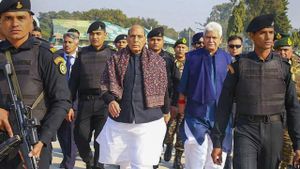Imphal, Manipur has been shaken by violence as the Indigenous Tribal Leaders’ Forum (ITLF) reported disturbing attacks over the weekend, reigniting fears over the region’s long-standing tensions. Allegations have flown, with claims from the ITLF asserting rival groups targeted tribal communities, setting ablaze several churches, homes, and even schools.
On the night of November 16, at least five churches, one school, and 14 homes belonging to tribal families were reportedly burned down by members of opposing communities, as stated by the ITLF. The organisation has been vocal about its grievances, especially concerning the purported negligence exhibited by security forces who were supposed to safeguard these vulnerable structures. Despite Supreme Court orders aimed at protection, it seems the enforcement was lacking when communities needed it most. "Baffling" is how the ITLF described the reaction of the Central Reserve Police Force (CRPF) stationed nearby during this onslaught, alleging they did not intervene when violence erupted.
This escalation of violence follows another tragic incident earlier this month, where attackers killed Haojoel Doungel, 27, and allegedly tortured him before leaving his body to be found. Doungel’s death highlights the increasing risk faced by residents amid the chaos. The ITLF has called for the Assam government to bolster its vigilance, warning of the potential for violence to cross state lines.
These developments come on the heels of broader ethnic strife, with reports indicating over 360 churches have been torched since the conflict flared up, raising alarming comparisons to religious warfare. The violence seems to revolve primarily around tribal communities; the Kuki-Zo, often targeted, are now finding it necessary to arm themselves for protection, according to ITLF statements.
The conflict dates back several months, predominantly influenced by long-standing ethnic rivalries between tribal groups and non-tribal groups. It has resulted from tensions largely rooted within the socio-political fabric of Manipur, which comprises various identities. This territorial and cultural conflict has often erupted violently, posing significant challenges to the peace of the state.
On the same weekend, protests also consumed the streets of Imphal. The Indian Youth Congress (IYC) coordinated candlelight vigils, aiming to draw attention to the urgent need for governmental intervention amid the growing crisis. Protestors voiced their concerns about what they regard as governmental negligence under the leadership of Prime Minister Narendra Modi. They criticized the lack of attention to the dire situation gripping Manipur, with Modi prioritizing rallies elsewhere over his home state.
The protests began outside the IYC office and aimed to reach Jantar Mantar, but police halted their progress. Leaders of the IYC have called for swift government action to address the rampant ethnic violence and protect affected communities.
Meanwhile, the unrest saw tragic collateral damage when the violence escalated on November 17, leading to the death of 21-year-old K. Athouba during confrontations with the police. Eyewitness accounts suggest it was during attempts to disperse protesters demanding justice following the abduction and deaths of three women and three children by suspected militants. Authorities attributed property vandalism to the mob, as they mobilized against perceived injustices against their community.
The mourning community’s anger is palpable, as many feel trapped between armed groups and authorities, with only sporadic interventions from law enforcement. The death of Athouba, confirmed during the skirmish with police, has compounded the chaos, leaving many unsettled.
Authorities have since enacted curfews across various districts, restricting movement to restore order. Education institutions have been ordered closed for safety reasons as tensions simmer beneath the surface. The closure affects districts including Imphal East and Imphal West, stricken by unrest.
Adding to the turmoil, mobile internet and data services have been suspended across seven districts as part of the efforts to control the situation, with officials citing law and order concerns. The fear is palpable, as anger and apprehension grow over the deaths and destruction, with communities yearning for stability.
The heartbreaking loss of life follows the discovery of six unidentified bodies earlier this month, believed to belong to children and women abducted by armed militants. Dreadful narratives have unfolded as families brace for answers surrounding their loved ones’ fates. This chilling incident has struck the heart of the community, pushing many toward the brink.
Activists and opposition voices are now compelling local and national authorities to reevaluate their approach toward Manipur, where unique ethnic tensions have drawn violent divides, igniting fear among residents. The ITLF asserts it settles for nothing less than palpable action from the government, cautioning against potential retaliatory violence from the Kuki-Zo tribes, whose patience is wearing thin.
Such sentiments reflect wider frustrations experienced throughout communities embroiled in ethnic violence, which, if unchecked, could lead to catastrophic consequences across households. Historical grievances persist, with insufficient resolutions contributing to the ceaseless back-and-forth between rival factions.
This situation remains volatile, with the people of Manipur torn between their quest for peace and the reality of their fracturing communities. Attention on the ground continues to heighten as dissent grows louder, urging the central government to act decisively to safeguard stability. The recovery of trust and future peace hangs delicately across the region, deeply intertwined with the elusive balance of power.
Violence has left scars across Manipur; the timely intervention of government forces and community leaders remains imperative if there is any hope of rebuilding from the ashes of conflict.



